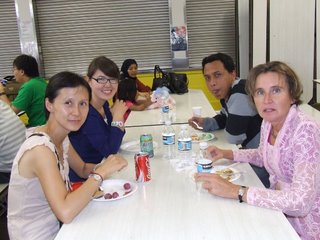

Interpreting Islam and its relations to other religions and ideologies in Southeast Asia, the Middle East, the U.S. and elsewhere.


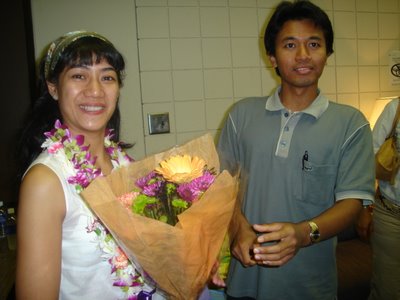
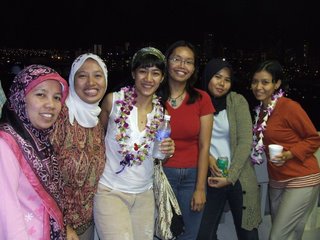
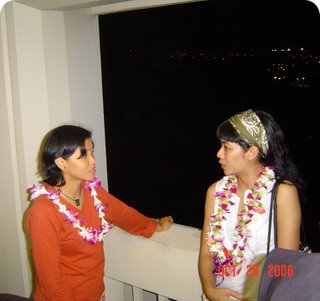
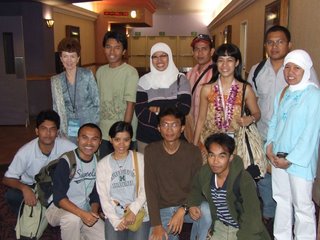

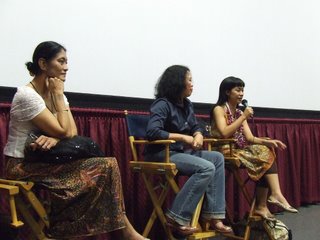
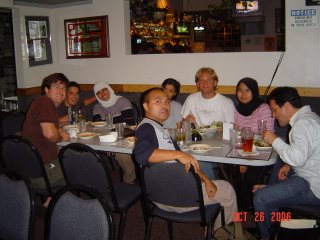

CURRICULUM VITAE
Name : Muhamad Ali
Place and Date of Birth : Jakarta, October 31st, 1974
Current Address : Hale Manoa, 1711, East-West Road, Honolulu, Hawai’i, 96848-1711, U.S.A.
Emails : muhali74@hotmail.com & muhamad@hawaii.edu
Phone : (808) 944-6296 (Honolulu, Hawaii)
Schools Attended:
1. Islamic Kindergarten, Jakarta, 1979-1980
2. Islamic Elementary School, Jakarta, 1980-1986
3. Islamic Junior High School, Jakarta, 1986-1989
4. Islamic Senior High School of Special Program (MAPK) and Pesantren (Islamic Boarding School) of Darussalam, West Java, instructed in Arabic, English and Indonesian, 1989-1992
Universities Attended:
1. Department of the Qur’anic and Hadith Studies, Faculty of Religious Studies and Philosophy, Bachelor of Arts in Islamic Studies, The State Islamic University of Syarif Hidayatullah, Jakarta, Indonesia, 1992-1997
2. Department of Islamic and Middle Eastern Studies, Faculty of Arts, Master of Science by Research in Islam and Politics in Modern Egypt and Indonesia, The University of Edinburgh, Scotland, 2000-December 2001
Courses: Islamic History, Middle Eastern History (Department of Islamic and Middle Eastern Studies), Research Methods in Religious Studies (Faculty of Divinity), Introduction to Politics (Department of Political Science)
Advisors: Prof. William R. Roff (main advisor), Dr. Andrew J. Newman
Professors: Prof. Carole Hillenbrand, Prof. David Kerr, Dr. John Chalcraft
Department of History, Ph.D. in History, The University of Hawaii at Manoa, Honolulu, Hawaii, 2002- May 2007
a. Major Courses: Traditional Southeast Asian History, Modern Southeast Asian History, World History, European History, Middle Eastern History, Religions in Southeast Asia, Social Movements, Ethnic Identity, World Religions, Research Methods in Southeast Asia
b. Advisors: Prof. Leonard Andaya, Prof. Liam Kelley, Prof. Jerry Bentley, Prof. Peter Hoffenberg, Prof. Michael Aung-Thwin, Prof Barbara Andaya
c. Dissertation title: “Transmission of Knowledge and Power Relations: Preaching, Teaching and Writing Islam in Colonial and Postcolonial South Sulawesi and Kelantan”
Professional and Certificate Programs
Master of Management (M.M.) University of Indonesia, and Certificate d’Aptitute à l’Administration des Entreprises, Université Pierre Mendes Grenoble Paris, Jakarta, instructed in French, English and Indonesian, 1999-2000
Research Assistant to Dr Arun Swamy, Ethnic Conflict in Southeast Asia, East-West Center, Honolulu, 2003-2004
International Cultural Studies Program, the East-West Center, Honolulu, 2003-2004
Professional Experience
Assistant Professor, Faculty of Religious Thought (Ushuluddin), Syarif Hidayatullah State Islamic University (UIN), Jakarta,
1998-2000: Department of the Qur’anic and Hadith Studies, teaching a course “Introduction to The Sciences of the Qur’an (Ulum al-Quran)”
2001-2002: Department of Islamic Political Thought, teaching three courses: The Muslim Politics, Orientalism, Islam and International Relations
Researcher, Center for Human Resources Development, Syarif Hidayatullah State Islamic University (UIN), Jakarta, 2002 :
Secretary to the Rector of University, Prof. Azyumardi Azra, Syarif Hidayatullah State Islamic University (UIN), Jakarta, 1997-1998, 2001-2002
Book Editor and Translator, PT. Penerbit Media Dakwah, Jakarta, 1996-1997
Student Organizational Experience:
1. Executive member, Student Council, Junior High School, Jakarta, 1988-1989
2. Executive member, the Arabic and English Department, Senior High School, West Java, 1991-1992
3. Vice Secretary, Islamic Student Association (HMI), State Islamic University, Jakarta, 1993-1995
4. General Secretary, Association of Darussalam’s Alumni, Jakarta, 1994-1996
5. Executive member, English Discussion of Granada, Jakarta, 1995-1996
6. Trainer, Islamic Student Association (HMI), Ciputat, 1994-1996
7. Member of Representative, University Student Union, Jakarta, 1994-1996
8. President, University Student Union, State Institute for Islamic Studies (IAIN) Jakarta, 1996-1997
9. Secretary, East-West Center Participants Association (EWCPA), September 2002-April 2003
10. Acting President, East-West Center Participants Association (EWCPA), May 2003- September 2003
11. President, Indonesian Students Association in the United States (Permias), Hawai’i branch, August 2003- August 2004
Languages:
Indonesian/Malay (native language)
Arabic: good reading, fairly good writing, fairly good speaking
English: good reading, good writing, good speaking
French: good reading, fairly good speaking, fairly good writing
Dutch: good reading, fairly good speaking
Academic Honours and Award Certificates:
Certificate for The Best Graduate, Islamic Elementary School, Jakarta, the Academic Year of 1986
Certificate for The Best Graduate, Islamic Junior High School, Jakarta, the Academic Year of1989
Certificate for The Best Graduate, Islamic Senior High School of Special Program (MAPK) and the Pesantren (Boarding School) of Darussalam, West Java, the Academic Year of 1992
Certificate for The Best Graduate, Bachelor of Arts (B.A.) in Religious/Islamic Studies, State Institute for Islamic Studies (IAIN) of Syarif Hidayatullah, Jakarta, Academic Year of 1997: GPA. 3.85 (out of 4)
Distinguished Service Award for commitment and contributions to the East-West Center Community, East-West Center, May 8th, 2003, 2004, and 2005
Walter Vella Prize for Original Research in Primary Sources with a paper titled “The Fatwa on Interfaith Marriage in Post-Independence Indonesia”, at the Nineteenth Annual Hawai’i Regional Conference of Phi Alpha Theta, Hawai’i, February 22, 2003
Walter Vella Prize for the Best Paper in Southeast Asian Studies, with a paper titled “Islamic Nationalism: The Religio-Political Thought of Abdurrahman Wahid”, East-West Center International Graduate Student Conference & SHAPS 14th Annual Graduate Student Conference: A Joint Conference, Honolulu, February 20-23, 2003
Taraknath Das Prize for the Best Graduate Paper in Asian History for the 2002-2003 academic year, Department of History, University of Hawaii at Manoa, May 2003
Taraknath Das Prize for the Best Graduate Paper in Asian History for the 2003-2004 academic year, with a paper titled “Chinese Muslims in Indonesia: Post-diasporic Identities”, Department of History, University of Hawaii at Manoa, May 2004
Moscotti Award for the Best Paper in Southeast Asian Studies, Centre for Southeast Asian Studies, University of Hawaii at Manoa, April 2004, with a paper titled “The Rise of Liberal Islam Network in Contemporary Indonesia”
Bachelor of Arts’ Thesis (in Indonesian):
1. Methodology of the Quranic Exegesis of Fazlur Rahman and Toshihiko Izutsu: A Comparative Study, defended on February 1997
M.Sc. Thesis and Papers (in English): Edinburgh, Scotland, 2000-2001
Islam and The Nation-State in Modern Indonesia: Religio-Political Thought of Abdurrahman Wahid, Master’s thesis, September 2001 (15.000 words)
The Concept of Umma and the Reality of the Nation-State: A Muslim and Western Discourse, paper, January 2001 (5000 words)
Islam and Nationalism: Perspective of Modern Egyptian and Syrian Intellectuals, paper, paper, March 2001 (5000 words)
A History of the Umayyad Dynasty, paper (2500 words)
“The land of the three religions” – how valid is this description of Islamic Spain? paper, (2500 words)
A History of Islamic Revivalism, paper, (2500 words)
Pan-Arabism, Islamism, and Nationalism: “Pan-Arabism was always a far more compelling ideology for people in the Middle East between the wars than either regional nationalism or Islamic revivalism. Discuss.”, paper, (2500 words)
Publications: Articles in Indonesian and Arabic languages
Religion and Spirituality in the Modern Society, Kompas, February 1996 (10 pages)
Legal Status of Suicide in Islam, Harian Terbit, March 1996 (6 pages)
The Phenomenology of the Quran and the Muslim Community, Harian Terbit, March 1996 Islam and Modernity (in Arabic), Majalla al-Midad, Jakarta, June 1996 (5 pages)
Imam Khomeini and Revolutionary Ideas in Iran, Journal Gong no.6/V/1996, Jakarta (10 pages)
Religion in Economic Crisis, Harian Terbit, April 1998 (5 pages)
The Strategic Roles of Islamic Student Association (HMI), HMI 50’s Anniversary Book, 1998 (6 pages)
Inter-faith Prayer, Media Indonesia, 12-13 May 2000 (8 pages)
The Hypocrite, Kompas, 14 June 2000 (5 pages)
A New Paradigm of Religious Mission, Kompas, 14 July 2000 (5 pages)
Forgiveness in Politics and National Reconciliation, Media Indonesia, 7 July 2000 (5 pages)
Sense of Spiritual Crisis, Media Indonesia, 28 July 2000 (5 pages)
Religion as Liberating Force, Media Indonesia, 18 August 2000 (5 pages)
The Political Representation and Participation of Women, Media Indonesia, 23 June 2001 (5 pages)
Promoting Religious Pluralism, Kompas, July 2001 (5 pages)
Religious Bureaucracy, Kompas, 3 October 2001 (5 pages)
Human Cloning and Religions, Kompas, November 2001 (5 pages)
Theology and Multiculturalism, Kompas, 19 December 2001 (5 pages)
Humanist Paradigm of Religiosity, Kompas, 18 January 2002 (5 pages)
Theology and Ecological Conservation, Kompas, 7 February 2002 (5 pages)
Politics of Democratic Pluralism, Kompas, 12 February 2002 (5 pages)
Terrorism and Religious Militancy, Kompas, 8 March 2002 (5 pages)
Hermeneutics and Religious Pluralism, Republika, 14 March 2002 (6 pages)
The Intolerance of Israel, Republika, 5 April 2002 (6 pages)
Pluralist-Multicultural Education, Kompas, 26 April 2002 (5 pages)
Peace Education, Media Indonesia, 2 May 2002 (6 pages)
Political Entrepreneur in Ambon’s Conflict, Kompas, 10 May 2002 (5 pages)
Dialogue of Holy Scriptures, Kompas, 17 May 2002 (5 pages)
Poverty and the Theology of Liberation, Kompas, 14 June 2002 (5 pages)
Religion and Corruption, Kompas, 12 July 2002 (5 pages)
Theology of Coexistence, Republika, 19 July 2002 (5 pages)
Is Indonesia a Secular State?, Kompas, August 2002 (5 pages)
Our World Need The Figure of Abraham, Kompas, Thursday, October 3rd 2002
Toward A Multicultural Islamic Civilization, Republika, Friday, October 11th 2002
To be Wise in Dealing With Terror, Republika, Wednesday, October 16th 2002
Multicultural Religiosity, Kompas, October 25th 2002
Toward A Moderate Religiosity, Kompas, Thursday, November 7th 2002
Anti-Terrorism, State, and Civil Society, Media Indonesia, Wednesday, November 13th 2002
Radicalism and The Urgency of Pluralist Missionaries, Kompas, Tuesday, November 19th 2002
Criticizing A Religious Edict (fatwa) of Death Sentence, Kompas, December 12th 2002
Cultural Solution: An Alternative, Republika, December 21st 2002
Toward A Tolerant-Pluralist Religiosity, Republika, Friday, January 3rd 2003
Bridging Science and Religion, Media Indonesia, January 10th 2003
The Moral Dimension of U.S Attack on Iraq, Kompas, January 20th 2003
Pluralist-Multicultural Theology, Kompas, Suara Pembaruan, January 21st 2003
The Challenge of Religious Freedom, Media Indonesia, January 24th 2003
Bridging Islam and the West, Suara Pembaruan, February 5th 2003
Piety and Tolerance, Suara Pembaruan, February 27th 2003
Religious Pluralism and Politics of Recognition, Suara Pembaruan, March 13th 2003
The Cultural Cost of the U.S Attack on Iraq, Kompas, Thursday, March 20th 2003
The Future of Inter-Civilizational Dialogue, Kompas, April 3rd 2003
Nurcholish Madjid, Intellectual, and Politics, Kompas, May 9th 2003
Politics of Pluralism of Pancasila, Suara Pembaruan, May 22nd 2003
War is the Spiritual Cancer, Kompas, May 23rd 2003
Justice and Civil Space in Aceh, Suara Pembaruan, Thursday, June 12th 2003
Globalization of Inclusive Education, Kompas, July 3rd 2003
War Against Poverty, Suara Pembaruan, July 7th 2003
The Urgency of Understanding Religious History, Suara Pembaruan, July 25th 2003
Religion and Politics, Kompas, August 5th 2003
Struggle Against Terrorism Through Civilizational Dialogue, Kompas, August 15th 2003
Paradigm Shift in Religious Understanding, Kompas, October 7th 2003
The Meeting of President George W. Bush and President Megawati and the War against Terrorism, Kompas, October 22nd 2003
Developing Religious Thought in Indonesia, Suara Pembaruan, November 18, 2003
The Capture of Saddam Hussein, Kompas, December 15th, 2003
The New Media and Spiritual Resurgence, Suara Pembaruan, December 21st 2003
Democracy, Religion And Substantive Politics, Suara Pembaruan, December 24th 2003
Toward Global Multiculturalism, Kompas, January 3rd 2004
Muslim Political Participation, Media Indonesia, April 16th 2004
Education as the Human Right and Education of Human Rights, Suara Pembaruan, June 14, 2004
The Significance of Presidential Dialogues, Kompas, June 22, 2004
Toward a Sovereign and Democratic Iraq, Kompas, July 1, 2004
Kerry-Edwards versus Bush-Cheney, Kompas, July 10 2004
Religious Pragmatism, Kompas, July 15 2004
The Crises of U.S. Public Diplomacy, Kompas, August 26 2004
The Intellectuals and National Enlightenment, Media Indonesia, October 8, 2004
Self-Criticism from Religious Leaders, Kompas, July 2006
The Challenge of Pluralism and Religious Freedom in Indonesia, Indopost & http://www.islamlib/., July 17 2006
Publications: Newspaper and Magazine Articles in English
1. Continuing the Struggle Against Intolerance, The Jakarta Post, Thursday, October 17th, 2002
2. Indigenous Beliefs and State Policies, The Jakarta Post, Tuesday, October 22nd, 2002
3. Support Islamic Schools, The Jakarta Post, Friday, November 15th, 2002
4. War is the Spiritual Cancer, Ka Leo Hawai’i, Monday, November 25th, 2002
5. Promoting Religious Pluralism, The Jakarta Post, December 5th, 2002
6. Merry Christmas from Muslims: A Lesson in Tolerance, The Jakarta Post, December 24th, 2002
7. Bush and Hussein Show Dangerous Intentions, Ka Leo Hawai’i, April 2003
8. Building Interfaith Trust, The Liberal Islam Network (www.Islamib.com), May 23rd, 2003
9. Misleading Media Must Mutate, Ka Leo Hawai’i, June 2003
10. Religious Philanthropy as Social Capital, Islam Liberal Network (www.Islamlib.com), July 10th, 2003
11. Moderating Radical Islamic Boarding School, The Jakarta Post, September 2nd 2003
12. East-West Relationships, A Complex Phenomenon, The Jakarta Post, September 9th, 2003
13. Remembering Global Humanist Edward Said, The Jakarta Post, September 30th, 2003
14. Shirin Ebadi Epitomizes Women’s Jihad, The Jakarta Post, October 10th, 2003
15. Ramadhan Month for Dialogue and Peace, The Jakarta Post, November 1st, 2003
16. Promoting Peace Education in the Month of Ramadhan, The Jakarta Post, November 15th 2003
17. The Politics of Religious Pluralism, The Jakarta Post, November 28th 2003
18. Getting Literate about Islam of Benefit for all, the Jakarta Post, December 13th 2003
19. Paradigm Shift in Religious Understanding, the Jakarta Post, December 26th 2003
20. Headscarf Ban and Multi-Secularisms, The Jakarta Post, January 20th 2004
21. Toward Global Multiculturalism, www.Islamlib.com, January 24th, 2004
22. Global Existence Requires Humanism, Kaleo Hawaii, February 4th 2004
23. Religion and Economic Development, The Jakarta Post, February 16th 2004
24. Religious Factor in U.S. Muslim Relations, The Jakarta Post, February 26th 2004
25. High Time for More Substantive Politics, The Jakarta Post, March 9th 2004
26. Mideast Peace Process after Yassin’s Killing, The Jakarta Post, March 26th 2004
27. The Phenomenal Rise of the Prosperous Justice Party, The Jakarta Post, April 20th 2004
28. Significance of Televised Public Dialogue on Voter Perception, The Jakarta Post, June 8, 2004
29. Role of Religious Philanthropy in Reducing Poverty, The Jakarta Post, June 19, 2004
30. Democratizing Religious Bureaucracy from the State, The Jakarta Post, July 8, 2004
31. Critical Assessment of Muslim Political Pluralism in Indonesia, The Jakarta Post, July 21, 2004
32. Democratizing Religious Bureaucracy, The Jakarta Post, August 8, 2004
33. Islamic Reformism from Within, The Jakarta Post, August 18, 2004
34. U.S. Public Diplomacy in the Muslim World, The Jakarta Post, August 27, 2004
35. Salafism and Terrorism Do Not Mostly Mix, The Jakarta Post, September 29, 2004
36. Ramadhan a blessing for Indonesian politics, The Jakarta Post, Saturday, October 16, 2004
37. Desires are to be sublimated not destroyed during Ramadhan, The Jakarta Post, October 29, 2004
38. Non-violence as a means to Combat Terrorism, The Jakarta Post, November 10, 2004
39. U.S., Indonesia and Religious Tolerance, The Jakarta Post, December 07, 2004
40. Humanity beyond Religion, The Jakarta Post, January 10, 2005
41. Islamo-Christian Civilization, The Jakarta Post, March 02, 2005
42. Islam in Indonesia has always been Multifaceted, The Jakarta Post, May 03, 2005
43. The experience of Islam in Multicultural Malaysia, The Jakarta Post, June 10, 2005
44. Muhammadiyah still lags behind in global education development, The Jakarta Post, July 04, 2005
45. Promoting multi-religious education, The Jakarta Post, July 29, 2005
46. The impact of MUI fatwas on Freedom of Religion in Indonesia, The Jakarta Post,August 08, 2005
47. Islamic Moderation in Singapore thrives in a Secular Environment, The Jakarta Post, Friday, August 26, 2005
48. Remembering Nurcholish as Indonesia's great teacher, The Jakarta Post, Wednesday, August 31, 2005
49. Mainstream Islam and Ahmadiyah in Indonesia, The Jakarta Post, 14 September 2005,
50. French Secularism: Religious Liberty and the Law, The Jakarta Post, October 01, 2005
51. Imams, the Good and the Bad, The Jakarta Post, October 21, 2005
52. Idul Fitri for Solidarity and Justice, The Jakarta Post, November 02, 2005
53. Working to Discount the Growing Theology of Terror, The Jakarta Post, November 18, 2005
54. Muslims, Minorities and the State in Indonesia, “Indonesia Outlook 2006”, The Jakarta Post, December 30, 2005
55. Hamas Victory and Middle East peace process, The Jakarta Post, February 03, 2006
56. Power Struggle being Waged Over Public Morality, The Jakarta Post, April 01, 2006
57. From Tolerance to Mutualities, The Jakarta Post, April 08, 2006
58. Bureaucratization of Islamic Law and Faith-based Power Politics, The Jakarta Post,May 05, 2006
59. Exclusive bylaws at odds with State Ideology of Pancasila, The Jakarta Post, June 19, 2006
60. Strengthening Moderate Islam in Indonesia, The Jakarta Post, August 4th 2006
61. Promoting Tolerant Nationalism, beyond Religious versus Secular, The Jakarta Post, September 1, 2006
62. Why the epithet “Islamic Fascism” is unhelpful to search for Peace, The Jakarta Post, September 12, 2006
63. “Pope, Islam and Future of Interfaith Dialog”, The Jakarta Post, September 21, 2006
Academic Papers and Speeches in Seminars and Conferences:
1. Paper entitled “One Year After 9/11 : An Indonesian Perspective”, East-West Center, September 11th, 2002, Imin International Conference Center, Honolulu
2. Media Briefing in front of various mass media in Hawai’i, entitled “U.S. – Muslim Relationships”, May 2003, East-West Center, Honolulu.
3. Paper Speech entitled “Islam and Nationalism in Indonesia”, at the Center for Southeast Asian Studies (CSEAS), May 2003, University of Hawai’i at Manoa
4. Speech entitled “Faces of Multiculturalism in Southeast Asia: An Indonesian Perspective”, June 29-July 12, 2003, Asia-Pacific Education Institute, East-West Center, Honolulu.
5. Speech entitled “Faces of Multiculturalism in Southeast Asia: An Indonesian Perspective”, The Friends of the East-West Center, the East-West Center and the Pacific and Asian Affairs Council, September 11th, 2003, Imin Center, Honolulu.
6. Speech entitled “Faces of Multiculturalism in Southeast Asia: An Indonesian Perspective”, Southeast Asia-Pacific Club, November 10, 2004, Honolulu
7. Speech entitled “Justice, Peace and Security: State of Affairs in Indonesia and the Netherlands”, The Indonesia-Netherlands Interfaith Dialogue, Minister for Development Cooperation of the Kingdom of the Netherlands & the Indonesia Embassy in the Netherlands, Den Haag, 28 February 2006
Newspaper and Magazine Features:
“The Goodwill Casualty of War”, by Dan Boylan, MidWeek, April 16th 2003, featuring my short biography and opinion on the Iraqi War
“Muhamad Ali Combines Leadership, Learning in a One-Two Punch”, Bridge: Friends of the East-West Center Newsletter, Spring/Summer 2004
“The Spirit of Ulama Plus”, Gatra, Jum’at, 30 July 2004
“Here is the Batavian New Generation” (Nih Dia Orang Betawi Baru), Femina, June 2006
Discussion Papers in Classes and Study Clubs: 1992-1997
1. Gender Equity: Western and Islamic Perspectives
2. Sayyid Qutb: An Intellectual and Political Activist
3. Revelation and Civilization
4. General Soemitro, Student, and Indonesia’s Future
5. Content Analysis: Toward A Contextual Approach to Hadith (Prophetic Tradition)
6. Ignaz Goldziher and His Views on Hadith
7. Is Female Circumcision Necessary?
8. The Pancasila (Indonesia State Ideology) in Academic Life
9. Semantic Analysis in Quranic Commentary: A Study of the Thought of Toshihiko Izutsu
10. The Growth and Development of Islamic Movements in Malaysia
11. Quo vadis the Global World?: An Islamic Perspective on an Ideal World
12. The Story of Zulkarnain (Alexander the Great?): A Quranic Commentary on Surah al-Kahfi: 83-101
13. The Islamic Reform of Indo-Pakistani Sayyid Amir Ali
14. The Narratives of the Biography of Muhammad: A Comparative-Critical Analysis on the Works of Muhammad Hussein Haikal, Al-Hamid Al-Husaini, and Fuad Hashem
15. The Principles of Historical Materialism
16. The Thought of Egyptian Sheikh Muhammad Mutawalli Al-Sharawi
17. The Book of Ibn Ishaq and the Book of Hadith
18. The Commentary Methodology of Abdullah Yusuf Ali: A Study of the Holy Quran: Text, Translation, and Commentary
19. The Theology of Ahl Al-Sunna wa Al-Jama’a: A Historical and Doctrinal Study
20. Al-Imam Al-Bukhari: His Book of Sahih and A Controversy on His Credibility
21. Scientific Exegesis: Definition, Growth, and Development
22. An Introduction to Kitab Taisir Mustalah Al-Hadith of Muhammad Al-Tahhan
23. The Quranic Miracles Concerning the Unseen
24. Religious View on the Difference of Thought
25. Towards A Theology of Religious Tolerance
26. Quranic Hermeneutics
27. The Influence of Islam on European and World Intellectualism
28. An Introduction to the Methods and Trends of Quranic Exegesis
29. Towards An Enlightening Religious Dialogue
30. Organizational Orientation for Youth
31. Monetary Crisis and Business Ethics
32. Empowering Civil Servants and Improving Work Ethics
33. Conflict Management and Social Dynamism
34. Project Management: Feasibility Study and Proposal Making
35. Management and Organization: Problem Solving and Decision Making
36. Islam and Human Rights
37. Religion as both Factor of Conflict and Factor of Social Integration
38. The History of Islam: Past, Today, and Future
39. The Liberating Faith
Book Reviews (in Indonesian): 1999-2000
1. Islamic Theology and Culture in Indonesian Society: Lessons from the Sunni Theology
2. Harmonizing Text and Context
3. Observing Islam in Indonesia, by Prof Nurcholish Madjid
Publications: Book Translations 1999-2000
1. Popular Indonesian Literature of the Quran by Howard M. Federspiel (English into Indonesian)
2. The Quranic Reasoning by Ahmad Abd Al-Hamid Ghorab (English into Indonesian)
3. Improving Islamic Studies as A University Discipline in Muslim Countries by Azyumardi Azra (English into Indonesian)
4. The Picture of Indonesian Religious Life in 1999 by the Ministry of Religious Affairs (Indonesian into English)
Publications: Arabic Book Editing 1999
1. The Forty Hadith (Prophetic Tradition) by Al-Imam Al-Nawawi
2. The Biography of the Prophet Muhammad
Seminar/Conference Chairmanships:
1. “Liberal Islam and Fundamental Islam”, Seminar, Jakarta, 11 May 2002
2. “The Problem of Religiosity in the Context of Plurality”, Panel Discussion, Jakarta, 27-29 May 2002
3. “The Challenge of Democracy in the Muslim World”, Training for Muslim leaders, British Council, Jakarta, 7-9 June 2002
Field Research Experiences before PhD Program:
1. Research co-ordinator, The Indonesian and Malaysian Educational System: A Comparative Survey, 1997
2. Researcher, Religious Education in High Schools in Jakarta, 1997
3. Researcher, Business Ethics in Batavian Community, 1999
4. Researcher, The Transformation of the Islamic State University of Syarif Hidayatullah Jakarta, 1999-2000
5. Research Assistant, The Social and Cultural Roles of the Families of Hadrami Origins in the 20th Century Southeast Asia, Prof. Michael Gilsenan of New York University, U.S.A., September 1999-March 2000
6. Researcher, The Condition of Prayer Places in Offices, Business Centres, and Educational Institutions in Jakarta, May-August 2002
Grants and Fellowships:
1. Department of Religious Affairs of the Republic of Indonesia, Islamic high school Special Program (MAPK) Scholarship, Pesantren of Darussalam Ciamis, West Java, 1989-1992
2. Surat Perintah Sebelas Maret (Supersemar) Undergraduate Scholarship, 1996-1997
3. British Chevening Awards, M.Sc at Edinburgh University, 2000-2001
4. East-West Center Fellowship, PhD at the University of Hawaii at Manoa, August 2002- May 2007
5. East-West Center Research Grant, 2006
6. Ford Foundation Fellowship, Jakarta-Honolulu travel grant, August 2002
7. Ford Foundation Research Grant, 2005
8. The Toyota Foundation Southeast Asian National Research Grant Program (SEANRP), Fieldwork Project entitled “Islamic Knowledge and Power in Colonial and Postcolonial Indonesia and Malaysia: Case Studies of South Sulawesi and Kelantan”, 2005-2006
Publications: Books
1. Multicultural-Pluralist Theology (Teologi Pluralis Multikultural), Publisher: Penerbit Buku Kompas, Jakarta, October 2003.
2. Forthcoming. “Islam and the West: Bridging the Gulf after 9/11”, 2006/2007
3. Forthcoming. “Religious Tolerance and Pluralism in Indonesia”, 2006/2007
Publications: Working Papers
Islam and Economic Development in New Order’s Indonesia (1967-1998), East-West Center Working Papers, no,12, 2004
Publications: Journal Articles
1. “Fatwas on Interfaith Marriage in Indonesia”, Studia Islamika, Indonesian Journal for Islamic Studies, vol.9, no.3, 2002
2. “Religion as a Factor of Conflict and Integration”, Refleksi, Faculty of Ushuluddin, State Islamic University, Jakarta, 2002
3. “Pluralism of Islamic Interpretations”, Gong, Faculty of Ushuluddin, State Islamic University, Jakarta, 2001
4. “Inter-civilizational Dialogue”, Resonansi, vol.1, no.2, 2003
5. “The Umma and the Nation-State: Western and Islamic Perspective”, Kultur, vol.1, no.3, 2002
6. “Religious Pluralism in the United States”, Syir’ah, Jakarta, February-March, 2004
7. “Honoring Religions”, Peace & Policy, Volume 9, 2004.
8. “The Rise of Liberal Islam Network in Indonesia”, American Journal of Islamic Social Sciences, volume 22, winter 2005, number 1
9. “Understanding Muslim Plurality: Problems of Categorizing Muslims in Postcolonial Indonesia”, Refleksi: Jurnal Kajian Agama dan Filsafat, vol.VII. No.2, 2005
10. “Indonesia’s Tradition of Moderation”, Democracy at Large, vol.1, no.1, December 2004
11. “Menengok Barat, Mengembangkan Tradisi Ilmiyah di Indonesia”, Mimbar Agama dan Budaya, vol.23, no.1, 2006, pp.25-41.
12. Forthcoming. “Muslim Perceptions of Maluku Conflict 1999-2002”, Pacific Affairs
13. Forthcoming. “Transmission of Islamic Knowledge in Kelantan”, The Journal of the Malaysian Branch of the Royal Asiatic Society, December 2006
14. Forthcoming. “Chinese Muslims in Indonesia: A Post-Diasporic Experience”, under formal review, Explorations, Center for Southeast Asian Studies, the University of Hawaii at Manoa, 2006
15. Forthcoming. “Categorizing Muslims in Postcolonial Indonesia”, Moussons, 2006/2007
Publications: Book Review Essays
1. Robert Day McAmis, “Malay Muslims: the History and Challenge of Resurgent Islam in Southeast Asia” (2002), Journal of Asian Studies, November 2003, vol.62, no.4
2. Giora Eliraz, “Islam in Indonesia: Modernism, Radicalism, and the Middle East Dimension” (2004), American Journal of Islamic Social Sciences, vol.22, Summer 2005, no.3
3. Anna M. Gade “Perfection Makes Practice: Learning, Emotion, and the Recited Qur’an in Indonesia” (2004)” American Journal of Islamic Social Sciences, vol.23, Summer 2006, no.3
4. Mike Millard “Jihad in Paradise: Islam and Politics in Southeast Asia” (2004), American Journal of Islamic Social Sciences, vol.23, Summer 2006, no. 3
Manuscript Referees
Referee of a manuscript entitled “Demographics of Islam in Asia”, for Education about Asia, Vol. 10, no.1., Spring 2005
Referee of a manuscript entitled “Political Islam: A Trajectory of A Master Frame”, for the American Journal of Islamic Social Sciences, 2006
Publications: Book Chapters
1. Chapter “Intercivilizational Dialogue”, in the Book entitled Tafsir Menafsir Islam (Interpreting Islam) (Jakarta: Ma’arif Institute, 2005)
2. Chapter “Nurcholish, Intelektual, dan Kekuasaan” (Nurcholish, Intellectual, and Power Politics”, in the Book entitled Begawan Jadi Capres: Cak Nur Menuju Istana (Jakarta: Paramadina, 2003)
3. Chapter “Remembering Nurcholish as A Great Teacher”, Mengiringi Kepergian Cak Nur (Jakarta: Paramadina, 2005)
4. Forthcoming. Chapter entitled “Gerakan Islam Moderat di Indonesia” (Moderate Islamic Movements in Indonesia), Peta Islam Indonesia (Jakarta: PPIM & CSIS, 2006)
5. Forthcoming. Chapter “Mengapa Membumikan Pluralisme dan Kebebasan Beragama di Indonesia” (Why Implementing Religious Pluralism and Freedom in Indonesia?), (Jakarta: Universitas Paramadina, 2007)
Publications: Encyclopaedia Articles/Entries
1. “Women, Gender, and Jihad: East Asia, Southeast Asia and Australia”, The Encyclopaedia of Women and Islamic Culture, Brill Academic Publishers, Leiden, 2004
Publications: Magazine Articles
1. “Tradition of Moderation in Indonesia”, Elections Today, published by IFES, Washington D.C., Vol. 12, No.3, 2004
Conference Papers:
1. Paper entitled “Islamic Nationalism in Post-Independence Indonesia: The Religio-Political Thought of Abdurrahman Wahid”, at The 2003 East-West Center International Graduate Student Conference & School of Hawaiian, Asian & Pacific Studies (SHAPS) 14th Annual Graduate Student Conference: A Joint Conference, Imin International Conference Center, Honolulu, Hawai’i, February 20-22, 2003
2. Paper entitled “The Fatwa on Interfaith Marriage in Indonesia”, the Nineteenth Annual Hawai’i Regional Conference of Phi Alpha Theta, Hawai’i, February 22, 2003
3. Paper entitled “Muslim Perceptions of the Conflict in the Moluccas, Indonesia”, at The International Conference on “Violence in Eastern Indonesia”, University of Hawai’i at Manoa, May 20-22, 2003
4. Paper entitled “Islam and National Economic Development in the New Order’s Indonesia (1967-1998)”, at the Twentieth Annual Hawai’i Regional Meeting of Phi Alpha Theta, University of Hawai’i, Honolulu, January 31st, 2004
5. Paper entitled “Religion Matters in World Conflict and Peace”, at Hawai’i Peace Conference titled “The United States in World Affairs”, organized by Toda Institute for Global Peace and Policy Research, Spark M.Matsunaga Institute for Peace, University of Hawai’i International Association of Educators for World Peace, Honolulu, February 7-8, 2004
6. Paper entitled “Islam and Economic Development in the New Order’s Indonesia (1967-1998)”, at East-West Center International Graduate Conference, Imin Center, Honolulu, February 19-21, 2004
7. Paper entitled “The Rise of Liberal Islamic Network in Contemporary Indonesia”, School of Hawaiian, Asian, and Pacific Studies (SHAPS), Honolulu, March 16-18, 2004
8. Paper entitled “Colonial Transformation and Radicalized Religions: The Dutch in Indonesia and the Spanish in the Philippines”, Harvard Graduate Student Conference in International History, Cambridge, Massachusetts, March 19-20, 2004
9. Paper entitled “Muslim Diversity in Contemporary Indonesia: History and Reflections”, ASPAC, University of Oregon, June 18-20, 2004.
10. Paper entitled “Tradisi Ilmiah di Barat dan Asia Tenggara” (Scientific Tradition in the West and Southeast Asia), State Islamic Institute (Sekolah Tinggi Agama Islam Negeri, STAIN) Salatiga, Central Java, March 2005
11. Paper entitled “ Islam and Global Education”, Global Education Convention, National University of Singapore, June 2005
12. Paper entitled “Postcolonial Construction of Dutch Colonialism: Historical Memory in Nationalist and Islamic Writings in 20th Century Indonesia”, Department of History, Leiden University, Toward An Age of Partnership (TANAP) Presentation, November 16, 2005
13. Interfaith Dialogue, The Netherlands Government and the Indonesian Embassy in the Netherlands, Den Haag, February 28, 2006
14. Paper “Mengembangkan Tradisi Ilmiah di Indonesia” (Developing Research Tradition in Indonesia), International Conference, Universitas Negeri Gorontalo, Gorontalo, July 15-16, 2006
15. Paper “Why Promoting Pluralism and Religious Freedom in Indonesia? (“Mengapa Membumikan Paham Kemajemukan dan Kebebasan Beragama di Indonesia?” ), Conference entitled “ the Future of Religious Freedom in Indonesia” (Masa Depan Kebebasan Beragama di Indonesia”, Nurcholish Madjid Memorial Lecture, Pusat Studi Islam dan Kenegaraan, Universitas Paramadina, Jakarta Rabu 19 July, 2006